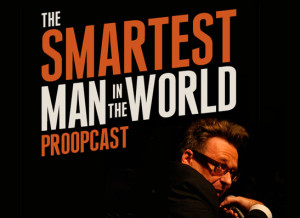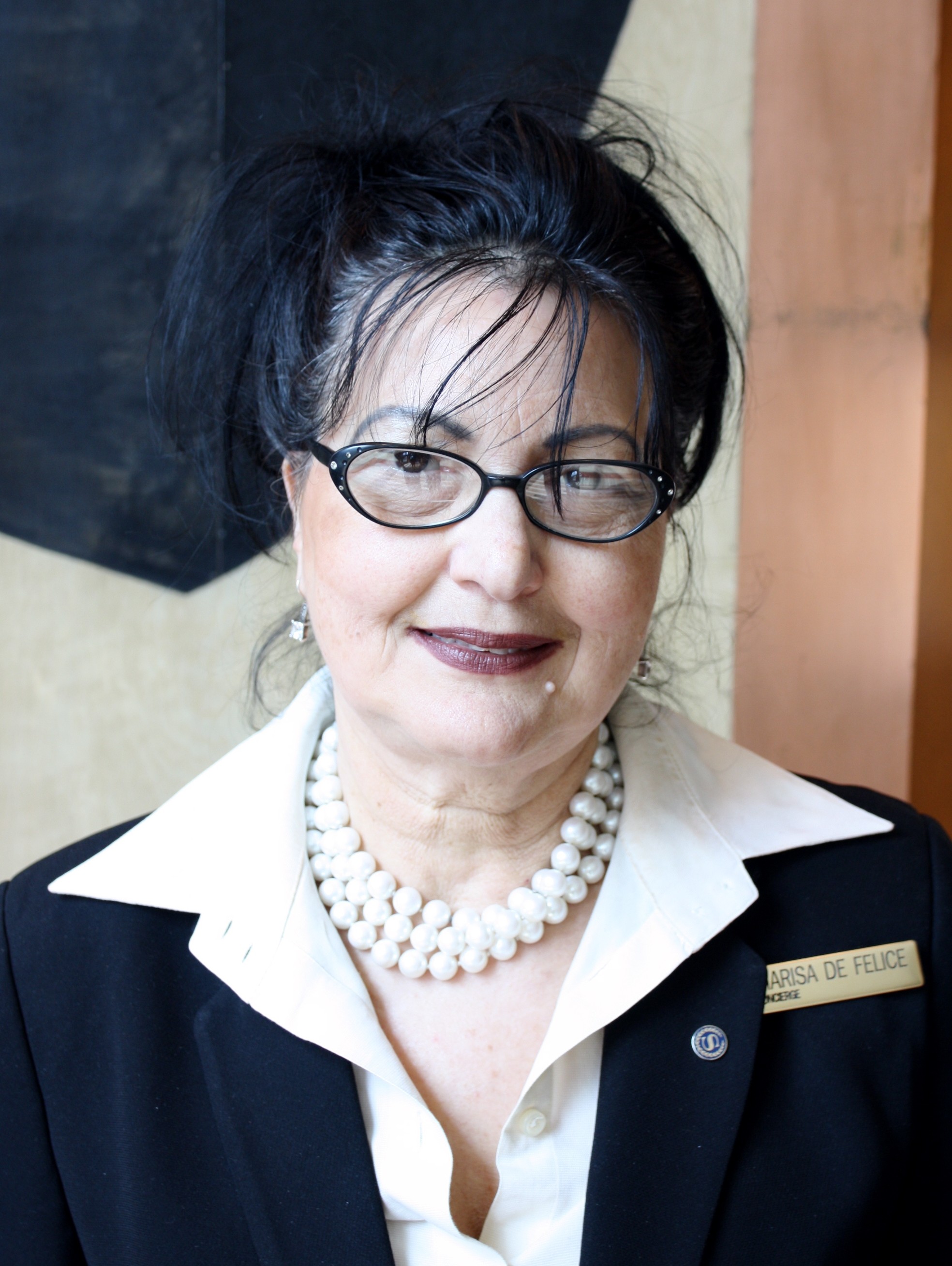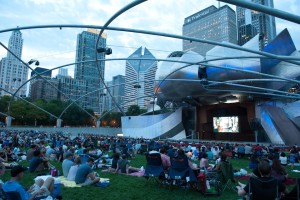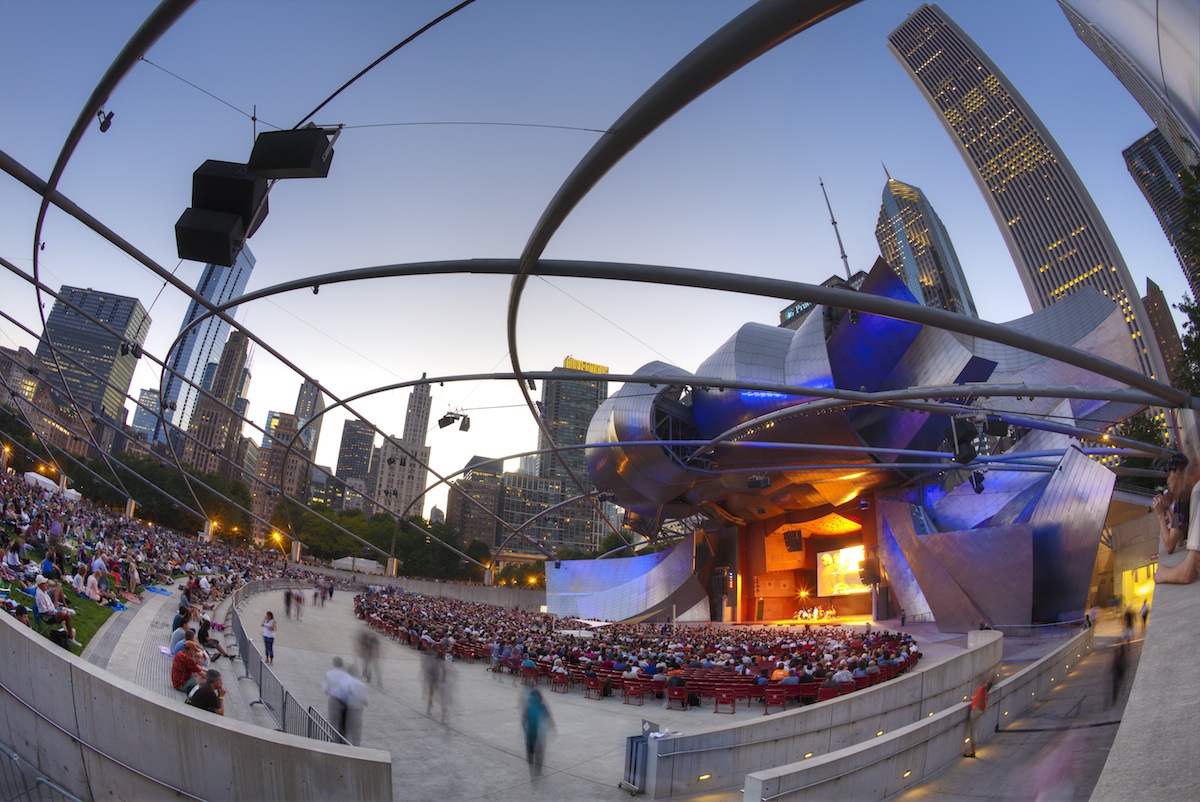We Ask, They Answer: Q&A with comedian and podcast host Greg Proops

The former Whose Line Is It Anyway? star sits down to chat about getting attacked on stage, Miley Cyrus, Nazi bikers and his podcast’s ramblings about things only he cares about
By Trent Modglin
Comedian Greg Proops, whose improvisation skills were on display in the former hit show Whose Line Is It Anyway? likes talking to people, speaking his mind on current events and making folks laugh. His own version of a podcast, called The Smartest Man in the World Proopcast, combines those three thin gs with a perfect balance, seamlessly and creatively weaving from one topic to another.
gs with a perfect balance, seamlessly and creatively weaving from one topic to another.
I spoke with Proops last week, in the midst of a run of live Proopcast shows in cities like Chicago, New Orleans and Vancouver to name a few, along with a few gigs in his adopted hometown of L.A. to fill the gaps in his busy but satisfying schedule. And if he was truly as jet-lagged as he claimed after “flying all over the bloody map,” I’d love to see him wide-eyed after a couple of beers. He’s just that entertaining, even over the phone, a whirlwind of stories and opinions and unapologetic humor.
Proops will be performing his The Smartest Man in the World Proopcast on Wednesday, Sept. 4 at UP Comedy Club at the corner of North and Wells in Old Town. Visit www.UPComedyClub.com for tickets to the show and www.GregProops.com for more information about his podcast, upcoming comedy shows and a video called “Greg Proops live at Musso & Frank’s” which will be available soon.
Q: You’ve been all over the place lately and have a pretty full podcast schedule coming up. Are you excited about Chicago?
Oh yeah, we did our podcast in April and it was great. And so I couldn’t wait to rebook. I’m trying to space it out a little bit so I don’t beat people up too much. (The last visit) happened to be the week after Roger Ebert  passed, so I had a lot to talk about. I love Chicago, and this time I’m coming in the night before so I can actually do a few things.
passed, so I had a lot to talk about. I love Chicago, and this time I’m coming in the night before so I can actually do a few things.
Q: Tell me more about your big Proopcast. They seem different than a lot of other podcasts because you tend to cover a lot more topics and current events, not just a guy rambling.
Well, I try to speak from the heart. And it kind of evolved this way organically. I didn’t set out to do it this way… when I first started I had no idea what I was going to say. And then after a few of them, my wife said, “This is the thing your best at.” So to find out 30 years into your comedy career that the thing you’re best at is drinking and blathering in front of a microphone, that’s something of a shock. I don’t have guests on my show. The audience is my guest, so I guess that’s the main difference. And the other thing is I talk about whatever is going on — and not just in my head, which is often the same thing: food or drugs or baseball. These last few couple of months have been just horrible, so you have to be try to funny around it. I did one (podcast) in San Francisco a few weeks ago, and it was the week of the Trayvon verdict and now we’ve got Syria going, so it’s been a bad stretch for humanity. But I try to find something funny to say about current events, and then of course I try to find something not funny to say about it, and that’s the boring and preachy part. And as much as I tell an audience it’s going to be boring and preachy, that’s usually the part they really like, so what can I say? … I think people just want to hear someone say something that’s close to a truism, you know? You can watch TV all your life and never hear anyone say anything true.
Q: I know I’m tired of all the reality TV and the politically correct approach to everything. I think people are tired of being filtered. They like the raw emotion and opinions and c omedy. They’re just tired of the politically-correct BS we’re dealing with in entertainment and news.
omedy. They’re just tired of the politically-correct BS we’re dealing with in entertainment and news.
I agree Trent, and I think that’s what people respond to. The reason these podcasts have become so popular is that seems to be the M.O. I don’t have any corporate masters, and no meetings are taken. Sometimes my wife will say, “Hey, why don’t you talk about this?” And that’s about as much as it is. It’s about as real as it gets. I’m going to come in and talk about what I feel strongly about. And I try to provide some facts. If I read something from a newspaper or book, I say what I’m reading. I don’t just go, “I think this, I think that.” I don’t do a Rush Limbaugh “by the way, I just made this fact up.” (Laughs) I think people are tired of that pre-packaged yuck. … This week it’s Miley Cyrus. It’s all good fun. I’m all for schlocky gossip because I think it’s a safety valve. But by the same token, when news stations start weighing in on Miley Cyrus’ psychological state, it’s kinda like, “Guys, surely there must be something you could report on.”
Q: And it worked perfectly for her, didn’t it? It’s like she’s toying with the rest of us. She knew what was going to come out of this, and it’s working perfectly for her.
Absolutely. It was a beautifully calculated piece of irrelevant schlocktastic noise that keeps us all focused on her. You know, if you’re not allowed to wear flesh-colored PVC shorts and stick your tongue out at 20, at what age are you allowed to do it, may I ask? If she was 85 and doing it, people would be saying no. You have to do it when you’re thin enough to pretend to hump your teddy bear on stage. If I did it, people would gross out.
But getting back to the podcast thought, at every one I do, generally if I have the opportunity, I meet everybody. I go into the audience and talk to everybody before the show, and I make myself available after the show as well. I spend a lot of time talking to everybody. I wouldn’t have done that as a stand-up because it kind of f—ks the magic a little bit to expose yourself like that. But with this show, it’s different. It actually makes the audience respond more and brings them closer. And I never would’ve thought that, and never would’ve thought that there would be a more direct way of communicating than stand-up, b ut I find that with this show I really want to meet everybody there. And I meet a lot of interesting people, and people give me lovely gifts and stuff. There’s this level of communication and a bit of an attachment. I always thought that stand-up was very immediate, like the news. But I find that podcasts are even more immediate.
ut I find that with this show I really want to meet everybody there. And I meet a lot of interesting people, and people give me lovely gifts and stuff. There’s this level of communication and a bit of an attachment. I always thought that stand-up was very immediate, like the news. But I find that podcasts are even more immediate.
Q: And I would imagine you get a lot of good topics for the next podcast just by chatting with people, especially the weird ones.
I’ve got so much. I’ve got a backlog of things I haven’t been able to cover. I was at Edinburgh at a festival, and the shows were only an hour long. And I tend to ramble on for more than an hour, so I didn’t get to cover much ground. The San Francisco one I did a month ago was about two hours and two minutes — it was shockingly long (laughs). It was more of a hostage situation really than a show.
Q: If you go over two hours here in Chicago, you better have beer vendors available.
That’s the best part of the UP theater. It’s beautiful inside, it’s really confortable and they have fantastic food and drinks, so I couldn’t be happier. I’m used to playing shitholes and dives, so it’s really nice to play in a place with carpet and a dressing room with a bathroom in it. And if I ask for a drink, they actually bring me a drink in a glass with ice and stuff. They don’t give me a plastic cup and go, “You know, we’ve been having a lot of trouble here lately.”
Q: (Laughing) That’s a perfect segue for a question I was saving for later: What’s the worst gig you’ve ever had where you didn’t think you’d be able to get through it?
I came out once in San Francisco pretty drunk, and I remember a guy wrote: “My liver hurt when Greg came on stage.” That snapped me into not drinking for a while. But of course I’m back now. You can’t be a quitter. The worse gig ever? There used to be this place outside of San Francisco called the Sunshine Saloon. It was kind of a biker bar, and they didn’t charge an admission to get in. The crowd was kind of, how shall I put this… indifferent. They served beer in buckets because you have to have an opposable thumb to hold a glass or a bottle. They would make people quit playing pool and turn off the TVs when the comedy started, and they were not happy when those were interrupted. I remember a guy pulled up on a bike outside and threatened me. And I bravely ran to my car and wept silently. That was after abusing the audience for half an hour.
But I think the worst one was a disco in San Mateo, California called Tingles. I was on this dance floor, and a cat came to the stage and I thought he was attacking me. He was this giant dude, so I picked up the mic stand and grabbed it like a baseball bat and I held it left-handed, which is unusual because I’m right-handed. And I told him, “If you come up here, I’m going to bash your f—king head in, you asshole.” And he got up on stage, took a bow to his friends and he went back and sat down. He wasn’t attacking me; he was just kidding around. And so the audience now is looking at me, and I’m waving the mic stand over my head about to kill one of them.
 Q: (Laughing) Good luck with that first joke after that, right?
Q: (Laughing) Good luck with that first joke after that, right?
As the classic line goes, it took me 10 minutes to get them back. They were a little pissed after that. I finished my act and did a half hour, but it was to no response. It was to them staring holes through me. And whenever these things happen, you go over to the owner or the manager and say, “Did you have to let me get killed?”
I was once at this place in Montana at a place called The Rocking Horse, and these dudes were on my dick the whole show. I was just fighting with them. And I came over to the manager afterward and said, “Hey, you gonna let these guys f—k with me the whole show?” And he says, “They helped build this place, man.” (Laughs) That was a scary gig. It may have been Idaho. That’s why it was so scary because it’s Aryan Nation and all that. And some of these bikers are Nazis. They provide the worst crowds (laughs), but it made the show hysterical. … I’ve had my mic turned off at a corporate gig and had all kinds of shit thrown at me. … I remember doing another show in San Francisco where there was no stage, and I stood on a picnic bench next to the DJ booth because the DJ had the only mic, which had about three feet of cord.
People never consider that stand-up comedy is a spoken-word craft, and therefore there are only two things that are important: Can I be seen and can I be heard? And those two things sometimes go right out the window. People just think you can do it anywhere like you’re a guitar player. That always makes me laugh.
Q: It makes that heckler seem kind of passive by nature, doesn’t it?
No heckler’s ever stopped my… well, there was this one guy who was so jolly and laughing at everything. I asked him: “Why are you so happy? You’re laughing at all my jokes?” And he said, “I just got out of San Quentin (prison). I did a seven-year stint there.” And I said, “Jesus, f—k me. “ And he goes, “If you had been there, we would’ve.” And the whole crowd exploded, and I fell over on stage. There’s no way to top that. You let him win. And it was the funniest goddamn thing I’ve ever heard anyone say.
Q: I’ve seen a lot of stand-up in my day, and hecklers are so rarely funny. They have a liquid courage in them, they think they’re funny, and then they quickly prove they’re out of their league.
… You’ve got to swing your dick on stage. I learned early on to never, ever relinquish control. I saw it from Bobby Slayton and some of those guys. I watched their control on stage, and control is a big thing. That’s why when you get angry, it’s not funny. You should never really cry as an actor, and you should never really get angry as a comedian because it’s weak. It’s so weak. It puts the audience off and makes them feel terrible. They want you to win, they really do. And of course they want you to be as funny as humanly possible.
Q: I’m a big fan of “Whose Line is it Anyway?” Is there any chance that show was as fun to do as it was to watch?
I loved doing it, and because I did the English version first, I was able to travel all around the world and perform for people. I was just in Ireland, Scotland and England, and then Norway, Amsterdam and Paris. … It’s opened every door for me, so that part’s been magnificent. I enjoyed playing with the people from the show more than I actually enjoyed making the TV show. I’ve been in a group (Whose Live Anyway?) with Ryan (Stiles) and Jeff (Davis) and Chip (Esten), and sometimes Joel Murray sits in with us when Chip can’t do it because Chip’s down in Nashville. Joel Murray is an old Second City alum. And just playing with those guys is just hilarious. We really yuk it up and drink and stuff.
Q: You lived in London for four years. Can you describe the difference between the different sense of humor between the British and Americans?
I think their sensibilities are slightly different. They do like jokes. Jokes are big. They do respond to them. They don’t laugh at tags as much. American audiences will let you tag something 50 times. However, they do let you freestyle a bit and act really weird. You don’t have to have a topic sometimes for an English crowd; they’re willing to go with the flow.
… Everyone, all around the world, has become slightly less literate though. You used to be able to make Bible references or literature references or even classic movie references and expect that everyone understood them, and now that’s not quite as prevalent. And I mean that about England, too. England was a place where I always thought their culture was a little more oriented that way. In England, when you’re a comedian, you’re expected to be able to read and write and acquit yourself in a variety of ways, and they’ll ask you to write a column about this or that. And no one ever asks a comic to write a column in America. But I found that in England, you have to defend your position. You’d be on political things and panels with people of different interests and groups and this and that. You can’t just say, “I think this and that because I feel real strongly about it.” You can’t give it the Elisabeth Hasselbeck. They don’t play that. If you can’t back up what you believe in, they don’t even want to hear from you. And that’s the part of England I really appreciate. They’re not easy friends. In Hollywood, everyone’s your friend, but they’re not really your friend, you know? In England, no one’s your f—king friend, but if you know them for four or five years, they’re your friend forever. They’ll give you the benefit of the doubt, but you’ve got to prove it. There’s no skating. If you’re not funny, they will f—king let you know.
There’s no place I don’t like playing. People always ask, “Where is your favorite place to play?” And I say Paris. And they go, “Really, why Paris?” And I’m like, “Because you’re in Paris. You’re not in f—king Cincinnati or whatever.” It’s the same thing about Chicago. Why do you like playing in Chicago? Well, because you’re in Chicago. I can go get out after the show. Nothing’s closed. When you’re playing Decatur, it’s a hotel room. At Peoria at 1 in the morning, ain’t nothing shaking. But in Chicago at 1 in the morning, I can get a taco or crack or whatever it is I require. … Near the hotel I’ve stayed at, there’s this old-fashioned, cheese fries, crappy, open-all-night diner kind of place, and I’d go there drunk in the middle of the night. Just me and a bunch of hoodlums. That’s what I love.
Q: Sounds perfect. There you go. I suppose good comedy doesn’t come out of sitting in your hotel room the whole time, does it?
Well, it does if you’re working (laughs). But Chicago doesn’t make you want to sit in your hotel room. It makes you want to get out and see stuff.
Q: I know you don’t come here that often, but is there something that you have to see or have to eat when you’re here?
I know it’s sad, but the Original Pancake House. For some reason, in all the years I’ve come to Chicago, I’ve never stayed far from it. I go to breakfast there every f—ing day. I think they must think I live in Chicago or something. … Because I’m a big girl, upstairs at Barney’s they have a really delightful restaurant. And sometimes if I’m alone, I’ll go there and have a little girl lunch for myself.
Q: Please tell me you’ve frequented the Old Town Ale House across the street from UP.
Oh yeah, Second City people have been taking me there for years. Lots of history there I know. A couple doors down is this Italian place (Dinotto Ristorante). It’s around the corner from all the comedy clubs, it’s open late, everyone is really nice to me and I love Italian food. I think they know I’m a comic, but maybe they just think I’m a single alcoholic who likes Italian food.
Q: Who is the funniest person in your world?
Oh, my wife I think. She’s hilarious.
Q: Is that a necessity, or at least a big thing for a comic to have someone who can keep up with them?
No, I think a lot of comics are really competitive and they want someone around who is not as funny as them. But I’m not of course that unevolved. . … I make her laugh, and then she makes me laugh. I can’t abide people with no sense of humor. And worse than people with no sense of humor are people who think they’re funny, which is terrible. You know, when they think they’re funny or think they’re cute. There’s a big difference between thinking you’re funny and being funny (laughs). If you’re funny, you don’t ever have to tell anyone you’re funny.
Q: Do you ever run into people who demand a joke or want you to make them laugh?
Most people are really nice. Once in a while, people go, “Would you like to hear a joke?” And inevitably I go, “No, I wouldn’t.” And then they tell you anyway, which I find wildly humorous. And then it’s always racist.
Q: Was that from the bikers in Idaho?
(Laughs) Hecklers always feel like you’re helping, and people with jokes always feel like you want to hear a joke because you’re a comic. But you wouldn’t go up to a lawyer and go, “Would you mind if I recall this case for you?”
Q: Last thing: Do you have a label as a comedian? What do you think your reputation is as a comic?
A lot of adjectives and profanity. A lot of rambling on about things I only care about is kind of the hallmark of my awesomeness. I try to educate while boring people (laughs). And the podcast has given me the horrible opportunity to focus on that. A friend of mine, Joe Bowman, gave me the title for the podcast because he said, “Do you know what you come off like?” And I said, “No, what do I come off like?” And he said, “Like you f—king know everything.” And I said, “Oh my god that’s hilarious.”








